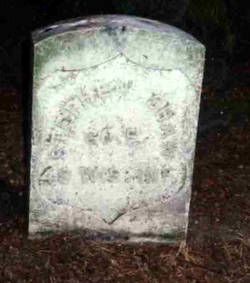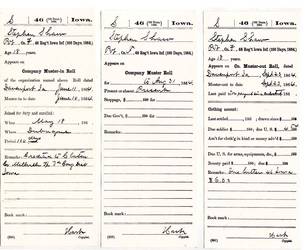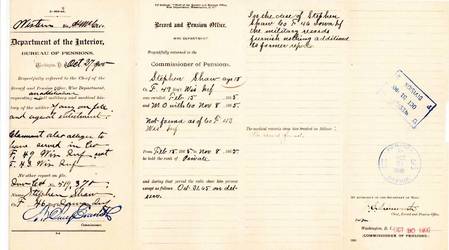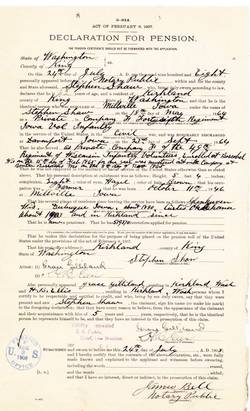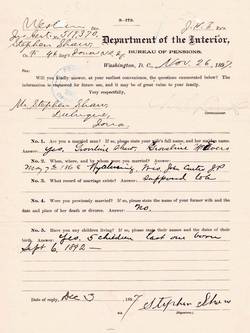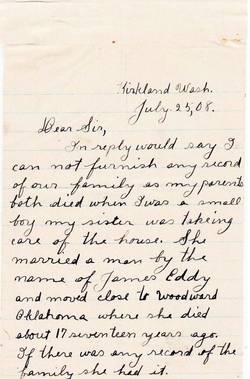Stephen Shaw
Representing: Union
Unit History
- 46th Iowa Infantry Co. "F"
- 49th Wisconsin Infantry Co. "F"
Full Unit History
46th IOWA VOLUNTEER INFANTRY
Organized: Spring, 1864 Davenport, IA
Mustered In: 6/10/64 Davenport, IA
Mustered Out: 9/23/64
49th WISCONSIN VOLUNTEER INFANTRY
Organized: Late 1864/Early 1865 Camp Randall, Madison, WI
Mustered In: 2/1/65 Camp Randall Madison, WI
Mustered Out: 11/8/65 Benton Barracks, St. Louis, MO
Regimental History
NOTE: In the spring of 1864 Union Gen. U.S. Grant began amassing armies to drive deep into Rebel territory and bring an end to America's bloody four year civil war. As part of this process "experienced" troops were drawn from rear echelon positions and placed into the field. To fill this void, many short term - 100 day, 1 year - primarily non-combat regiments were created. Both the 46th Iowa and 49th Wisconsin were such organizations.
REGIMENTAL HISTORY: (46th)
The 46th, a 100 day western theater regiment, was organized and mustered into Federal service during the spring of 1864. Leaving the state it was assigned to duty in Tennessee garrisoning forts and guarding railroads.
About mid- August, near Collierville, TN men of the 46th were involved in an engagement with the enemy. This necessitated others being sent to the aid of those under attack and, if possible, to the rescue of two captured 6th IL cavalry troopers. During this operation a captain and three enlisted men were wounded; the captain and one of those men severely.
The 46th was returned to Iowa and mustered out of existence at the end of its term of service.
Regimental Losses: Officers killed or mortally wounded = 0; Officers died of disease, accidents, etc. = 0; Enlisted men killed or mortally wounded = 3; Enlisted men died of disease, accidents, etc. = 23.
REGIMENTAL HISTORY: (49th)
This one year, western theater regiment was organized at Camp Randall, Madison, WI. It left the state on 3/8/65 and reached Benton Barracks St. Louis, MO two days later. From there it was ordered to Rolla, MO for guard and garrison duty.
Company assignments were as follows: Co. "K" was placed at Ft. Wyman, "I" at Fort Detty and "B" was sent ten miles east of St. James. Co. "A” was stationed at Waynesville in June, "D" at Big and Little Piney. In July, Co. "H" was sent to St. Louis for provost (military police) duty and cos. "D" and "E" to Benton Barracks as permanent guard. In August the (entire) regiment was ordered to St. Louis for prison guard duty.
All companies were mustered out at St. Louis, MO between November 1 and November 8, 1865
Regimental losses: Officers killed or mortally wounded = 0; Officers died of disease, accidents, etc. = 0; Enlisted men killed or mortally wounded =0; Enlisted men died of disease, accidents, etc. =54.
Soldier History
SOLDIER: (46th)
Residence: Clayton Co., IA Age: 17.5 yrs.
Enlisted/Enrolled: 5/18/64 Rank: Pvt.
Mustered In: 6/10/64 Davenport, IA
Mustered Out: 9/23/64 Davenport, IA
Highest Rank: Pvt.
SOLDIER (49th)
Residence: Cassville, Grant Co., WI Age: 18.9 yrs.
Enlisted/Enrolled: 2/15/65 Boscobel, Grant Co., WI Rank: Pvt.
Mustered In: 2/15/65 Boscobel, Grant Co., WI
Mustered Out: 11/8/65 Benton Barracks, St. Louis, MO.
Highest Rank: Pvt.
Family History
PERSONAL/FAMILY HISTORY:
Stephen Shaw was born 10/11/46 in Millville, Clayton Co., Iowa. His parents were Samuel P. (b. 1800 NY), a chair maker, and Nancy (Jane) (nee Becker b. 1807 NY) Shaw. He was the youngest of seven children and last of the Samuel P. Shaw lineage as Samuel died in 1853.
Siblings of Stephen were: Victor (b. 1826 IL), Irena (b. 1828 IL), Lydia (b. 1833/’34 IL), Henry (b. 1835 IL), Anna (b. 1837 IA), Peter (b. 1839, IA), William (b. 1840 IA), Margaret (b. 1843 IA), Samuel (b. 1845 IA) and Stephen. As noted by birth states of the children, the Shaws removed from Illinois to Iowa at some point between 1835 and 1837.
While the reason for the Shaw move from Illinois to Iowa is not documented, likely it was the availability of new farmland because, although the family patriarch listed his occupation as "chair maker", the family residence was probably a farm as the census for 1860 listed the widow Shaw (who had not moved) as farming in Millville. Children under her roof at the time were William, Margaret, Samuel and Stephen.
On 5/18/64 just shy of being seventeen and a half Stephen enlisted in the U.S. Army. While muster records of the 46th IA Infantry show him to have been eighteen years of age, obviously, he was not. Did he look older than his years? Physical stats collected at the time of his enlistment indicated him to be 5’4" tall, having hazel eyes, a light complexion and brown hair. His occupation was noted as "farmer." This information does not portray him as a strapping young man passing as an adult. As such, some adult - perhaps his mother - had to sign consent for his entrance into the service. In many instances military service records from the National Archives are accompanied by enlistment papers. This, however, is not the case with Stephen's enlistment into the 46th, so we are left to conjecture about the "legitimacy" of his enrollment.
As for Private Shaw's period of service in the 46th, it was short and relatively benign with the exception of a bout with the mumps which would follow him the remainder of his life. More on this later.
Winding up his one hundred days of service Stephen squared financial accounts with the government - he owed Uncle Sam $4.64 for lost or broken equipment. He also owed $6.80 to the regimental sutler. (Sutlers were private vendors given government approval to follow the armies and sell foodstuffs and other items to the soldiers.) Since he had not been paid since enlistment, even receiving only $13 per month he had enough funds to cover his debts and have money left in his pocket.
Residentially, exactly where Stephen landed after leaving the 46th is not known. What is known is that by the following February when he again signed up for army duty, he had quitted Iowa and was residing in Cassville Grant Co., Wisconsin. What had drawn him there is not specified in available documents.
Private Shaw's new service regiment was the 49th Wisconsin Infantry. Again, it was a "short term" unit primarily organized to perform rear echelon, non-combat, duties. His enlistment was credited to the congressional district encompassing Cassville, his town of residence. For enlisting he received a $100 bonus or "bounty", one third of which was paid to him immediately with the remaining two thirds to come in later increments.
Private Shaw's time with the 49th proved very benign. Throughout the period of enlistment he was always mustered as "present" and, as far as can be determined, he was always with his company and regiment except during September and October, 1865 when he was noted as being on "detached service, performing some task at a new (powder) magazine located at (Benton Barracks) near St. Louis, MO.
Exiting the 49th proved to be an easy, primarily financial undertaking for Private Shaw. He had last been paid on 1/30/65, so he had a number of months back paying coming to him. He was also owed $33.33 of his enlistment bounty. On the other side of the ledger, his clothing account had never been settled, so he owed the government $21.88 in that category, plus another $92.42 for clothing (in kind) or money advanced (borrowed). He also paid an extra $6 to keep his “S.R. musket “and an additional $.63 “for (musket) appendages.” Exactly what appendages were/are is not known.
As best as can be determined, upon leaving the U.S. Army for the second and final time, Stephen settled in Glen Haven, (Co) Wisconsin. Why Glen Haven is not documented.
The next event of significance in Stephen's life journey occurred on 5/7/68 when, in Wyalusing Grant County, WI he wed to Groveline McEvers (b. 11/46 IL). The marriage would be the first and last for both. During their years together Stephen and Groveline would produce eight children, the names of only five of which are documented. Those children were: Nancy Jane (b. 1869 WI), Irene/Groveline (b. 1874 WI), James (b. 1876 WI), Ella (b.1879 WI) and Hazel Rosebud (b. 1892 IA).
Available documentation is silent as to where Stephen and Groveline set up their first household. One reason for that is, as with many American Civil War veterans, Stephen and family cannot be found in the census tally for 1870. Most likely, however, the Shaws were in Wisconsin as, in later years, Stephen would note having lived in that state until sometime in 1880. As for the 1880 census, that accounting placed the Shaws - Stephen, Groveline, Nancy, James, Irena and Ella - in or near the Grant County community of Glen Haven. While it is possible that Stephen was occupied with farming, that is not specifically noted in the '80 census. Further, at some undocumented, post military point, Stephen became a steam boat river pilot...........
As noted by Stephen's documentation and the birth states of the Shaw children, by 1892 when daughter Hazel was born, the Shaws had removed from Wisconsin to Iowa. While there is no census data from 1890 pertaining to the Shaws- most of it was destroyed by fire - likely the inter- state move was motivated by the search for ever-more fertile farming land. Still, it could have been spurred by the desire to find another river to conquer as a pilot.
During the 1890/'92 years, besides moving his family from one state to another, former Civil War infantryman and cavalry trooper Stephen Shaw initiated the paper chase necessary to obtain a U.S. Government disability pension based on physical disabilities which he traced back to his soldiering days. In Stephen's case this referred to his continuing inability to earn a well man's living performing manual labor. The impediments to his performance he placed back on his earlier mentioned bout with mumps while serving with the 46th Infantry.
Accumulating affidavital testimony from years prior to his military services as well as from former army comrades, the following story emerged as was presented by one of those comrades: "I am well acquainted with Stephen Shaw. I was with him when he had the mumps. It was about the first of August, 1864.......He was sick with the mumps for about three weeks. He seemed to be getting better (but) the men was scarce. He was ordered on duty, put on picket and guard, and took a severe cold on (top of) the mumps which caused him to contract a bad cough. He was put back on the sick list again." On some undocumented date, the evidence pointing to Stephen not being the physical specimen he was when he entered the military prompted the U.S. Government to grant him a monthly pension stipend of $6.
As the 1890s drew to a close there were efforts to have Stephen's pension stipend increased, but all came to naught because government officials did not consider there to be enough evidence to warrant an increase. Still, Stephen's physical problems continued to multiply. For example, a 6/1/99 medical examination performed by a Dubuque, IA physician prompted the following: "I have been acquainted with the soldier for six years. In November, 1893 I treated him for acute rheumatism. On 4/26/99 it was for heart palpitations accompanied by vertigo and disease of vision likely the result of the rheumatism. I currently find he has a weak heart. All together these indicate a probable total disability from performing heavy work and 50% disability for light. His eyes are in especially bad shape. Their condition would totally prevent him from pursuing his occupation as a steamboat pilot. I would recommend an eye exam by a U.S. Government pension representative."
Another examination conducted near this same time concluded the following: "I have known the soldier since June, 1890.He is afflicted with chronic hyperbolic rhinitis (inflammation of mucous membrane in the nose), granular pharyngitis (inflammation of Pharynx) and foetid ozoena (offensive order of mucosal crust). At times the odor is quite bad. There is also a soft varicocele (soft lump), medium size and painful and larger when following his occupation as a river pilot, (which necessitates his) turning (the ship’s) wheel and (being) compelled to maintain an erect position for hours. Hearing and heart impairments. Impaired vision - more so at night – hinder and incapacitate him when following his (steamboat pilot) employment.” As a final note the examining physician also added, “There is also a stiffening of the right shoulder in bad weather. He needs a federal exam." Based on such testimony, on some date which is not provided in available documents, Stephen’s pension was increased from six to eight dollars a month.
Still, even with all this medical talk about Stephen's inability to work being thrown about, when the census of 1900 found fifty three year old Stephen, Groveline and Hazel residing in Julien, Dubuque Co., IA, he claimed as his occupation "river pilot." Hard to keep an old soldier down...........
1905. Sometime during the first five years of the new 20th century Stephen and family departed Iowa and moved to the Puget Sound region of Washington State. As is often the case, what drew them to the region is not documented.
In the Pacific Northwest they were found living in or near the King County community of Kirkland located east of Seattle across Lake Washington. The now 58 year old Stephen was, again, seeking to increase his $8 per month pension stipend because of increasing health problems including affliction of his respiratory organs which was causing him to be short of breath, rheumatism and catarrh (infection.) Also noted were liver and kidney problems as well as poor hearing and poor eyesight. Available documents are silent as to whether or not an increase was granted.
The census for 1910 found the Shaws - Stephen 61 and Groveline, 62 - still residing in Kirkland. Under the household roof was daughter Hazel, but also a new born child. According to family sources, that child was Herbert E. Cartwright (b. 3/27/10 WA), the son of Hazel and her husband, Joseph Cartwright.
On 12/23/10, Groveline died of an undocumented cause or causes. She was buried in the Kirkland cemetery.
Stephen did not live long after Groveline's passing. On 1/11/11 he took ill. He required care and attention until death which visited him on 2/26/11. The cause of his passing was listed as apoplexy (stroke) and heart congestion. He was buried in the Kirkland cemetery beside Groveline.
Following Stephen's death relatives petitioned the U.S. Government in an attempt to recoup all or a portion of his funeral and burial expenses. On 9/14/11 $14.11 was reimbursed to the family.........So concludes another Civil War veteran's life story.
Cemetery
Buried at Kirkland Cemetery
